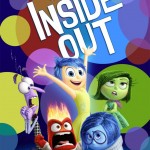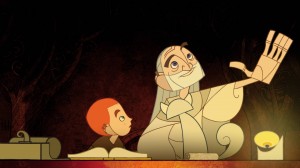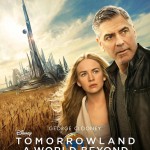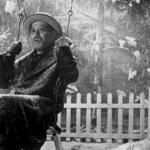A review by Jeffrey Overstreet
●
Writer / Director – Rebecca Miller; Director of photography – Ellen Kuras; Editor – Sabine Hoffman; Production designer – Mark Ricker; Producer – Lemore Syvan. STARRING: Daniel Day-Lewis (Jack Slavin), Camilla Belle (Rose Slavin), Catherine Keener (Kathleen), Paul Dano (Thaddius), Ryan McDonald (Rodney), Jena Malone (Red Berry), Jason Lee (Gray) and Beau Bridges (Marty Rance). IFC Films. 112 minutes. Rated R.
●
It happens again and again–the human endeavor to establish utopia.
The process begins innocently enough. A few people, led by conscience, react against some aspect of society and determine to make a better world. They might be reacting against corporate greed, religious intolerance, bigotry, pollution, sexual misbehavior, political corruption. It doesn’t matter much. What happens is that they decide to separate themselves from the problem, to “start the world over,” to lay down laws that will make the world safe for good people to enjoy life untroubled by the wicked.
But there’s a problem. Separatism can only serve to shut out certain varieties of evil … if it even accomplishes that. Human beings bring evil with them wherever they go. You can bet that if you’re building a wall to shut something out, you’re bound to find yourself trapped inside with whatever darkness emerges from your own people.
Many of these utopia-quests pledge to restore the quality of life they once knew in a “better” time.” Why? “The ’50s were a much more innocent time,” some will say. Others will be nostalgic for the ’80s. Scripture, on the other hand, counsels us not to talk as if past times were better than these. It’s a strange proverb, but there it is.
In Rebecca Miller’s new film The Ballad of Jack and Rose, the main character is clinging to the “free love” idealism of ’60s hippie culture. He is the last remaining resident of a commune on an island off the northeastern coast of the United States, and he is grieving as the hopes and dreams of that period slip away, just as his own life is slipping away under an unstoppable tide of physical corruption.
Jack (Daniel Day-Lewis) sits on the idyllic hillside near his bunker-like home and watches as the 21st Century encroaches on the borders of his home. He knows his idea-driven neighborhood is running on fumes, and he knows there’s little he can do to stop the housing developments, the conformity, the materialism climbing toward him like a tide of termites. But that doesn’t stop him from taking out his rifle and firing some shots off at some of those homes under construction.
His daughter Rose watches in a mix of sadness, amusement, and admiration. She has grown up here with her father, and it’s just the two of them. She has seen his disillusionment, but she has also come to savor the last days of this quiet, natural, wild wonderland. This is their Eden, or so Jack would like her to believe.
But just as Jack compromises his own ideals by sneaking away to carry on an affair with a sympathetic and spirited woman (Catherine Keener), so this Eden is about to be compromised.
Or rather, as Rose will learn and Jack will be forced to admit, this manmade Eden isn’t so innocent after all. For wherever human beings go to try and create a utopia, they will bring evil with them, and they will become the very thing they’ve tried to escape.
That was the message of M. Night Shyamalan’s The Village, and it’s definitely the lesson here. Miller’s storytelling, clearly inspired by her father’s life as a playwright in the ’60s, ’70s, and ’80s, creates a marvelous, rich, heartbreaking story that feels like a form of autobiography crafted into a fusion of fairy tale and cultural commentary. The way she leads us quietly through a troubling tale of a nearly incestuous relationship between father and daughter wisely refuses to turn its characters into monsters… it does something much better. It portrays Jack and Rose as three-dimensional human beings, one a teacher who slowly realizes he’s slipping into the clutches of his own evil nature, and the other a student who realizes that her conscience disagrees with the instructions of this giant that she loves.
Daniel Day-Lewis gives the first great performance of 2005 as Jack, making him endearing and frightening, principled and pathetic, a visionary and a tragic hero, a Lear that’s a little too in love with his daughter. Camilla Belle is sufficient as Rose, clear-eyed, pale with innocence, fragile, and yet fiercely intelligent. Catherine Keener is somehow more attractive than ever before as Jack’s spirited lover Kathleen.
But the film’s most memorable and surprising performance comes from Ryan Macdonald as Rodney, the oldest of Kathleen’s two boys, who comes to the commune and quickly catches on to the trouble brewing there. Paul Dano, who plays his wicked younger brother Thaddius, is equally convincing as a devil-in-the-making who lures the curious Rose out of her innocence and sets off the anger that’s been building in Jack’s heart.
Miller has sharp instincts as a storyteller, but her weakness is in loving her strong metaphors too much. Yes, we get that this is Jack’s idea of Eden. Do we really need Rose to struggle with her innocence at the site of a tree that has a snake living underneath it? Does she really need to dress like Little Red Riding Hood?
But these are minor complaints. As heavy-handed as the symbolism becomes, it certainly does its job. The true masterstroke of Miller’s storytelling comes in the conclusion, when she avoids the cop-out of condemning contemporary culture, and takes a much braver step, a step backwards… letting us see the larger picture: that both the future and the past as rife with corruption, that human beings cannot create heaven on earth.
Where, then, does hope come from? The film doesn’t seem to offer a clear answer. But there may be a hint in the moment when Jack comes to realize his own fallibility, when he puts his head in his hands and cries out, “God forgive me!”
It’s almost impossible for those who have followed the career of the playwright Arthur Miller, Rebecca Miller’s famous father, to watch this film without considering what it implies about the director’s relationship with, and perception of, her father. In interviews, Miller is fairly tight-lipped on this subject. It’s not very useful, or respectful, to speculate much on that question. But it is worth noting that while Miller’s daughter has clearly inherited her father’s talents for compelling an audience’s attention, she has fashioned that talent into a unique voice, one that hits notes both subtly poetic and tremendously dramatic. There are hints of Shakespearean tragedy throughout The Ballad of Jack and Rose, and there is a naturalistic style that recalls the films of Terrence Malick.
This is only her second film (her first, Personal Velocity, was memorable as well), but Rebecca Miller is easily in the company of Sofia Coppola as one of the most engaging and fascinating American women making movies today. I am eager to see what she does next.











